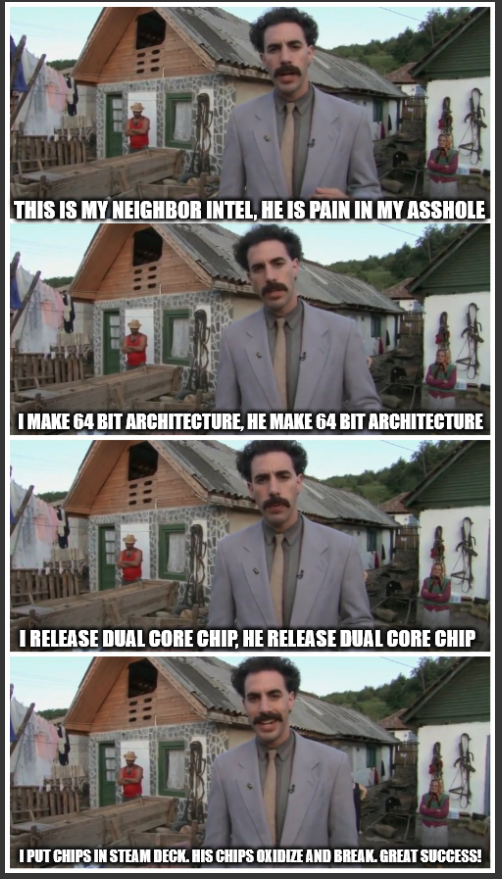- cross-posted to:
- technology@lemmy.zip
- cross-posted to:
- technology@lemmy.zip
So they got all that money from Uncle Sam’s CHIPS Act only to lay off 10,000 employees and make themselves “lean”. Govt funded unemployment.
Publicly traded companies are a curse on humanity.
All the idiot Americans cheering about scapegoating single mothers as welfare queens since the 80s, never an utterance by anyone with power of all the DO NOTHING private investors that drop their chips from their last trip to the exploitation casino and demand all the profit for no labor whatsoever.
“Fuck you, I’m an owner, pay me.”
Prior to the Jack Welch Ronald Reagan betrayal, the model was correcly “customers first, employees second, investors third.”
Everything falls apart when you give every spare penny to the people who A) dont DO anything to make the money they demand and B) demand the companies they own sabotage their missions and futures to goose net profit for the current quarter so they can profit and walk away having severely damaged those company’s ability to do what they existed for, only to demand it of other companies.
maybe the root-cause is less the publicly-traded part but rather the total lack of any consequences?
but yes i totally agree, any company publicly traded will get a payed-for-CEO after a while and latest at that point is where no problems are resolved any more, but instead are IMHO always created on purpose.
Problem with publicly traded is that there is no personal risk past the price you bought the stocks for. You paid $ 1,000 for some stocks of “evil chemical corp”? Now your financial interest, and thats the only measureable one, would want them to pollute for a damage of $ 10,000 respective to the stock value if that increases your stock price to $ 2,000, as long as the risk of them having to pay for cleaning it up is smaller than 50%. Problem is the same holds true for a damage of $ 100,000 relative to your stock. Or any arbitrarily large amount. Your share in the damage caused could be in the billions, but worst thing the company goes bankrupt and you loose your stocks buying price.
The only alternative would be holding shareholders responsible with their own money, if a company is forced to pay up for damages they caused, going past its bankruptcy.
like i said:
maybe the root-cause is […] the total lack of any consequences
but you used much more words ;-)
“publicly traded” does not imply that consequences would be impossible.
i see the opposite is true.
one could make that “public trade” also “very” public as in ownerships could only be changed together with a public note of who that new owner of that share is in person and only like not allow ownership changes more than twice a week per person, making investment more profitable than parasitic high performance trade. also the current lack of consequences could be improved by making the shareholders personally responsible for everything that the company does, including going to jail when the ceo left the country to not go there.
that could include making those responsible who owned that company at the time of its crime, making trust in the company way more important than that they can cause damage to society in macroscope just to profit in microscopical bits.
this way the shareholders would have a at least one trigger to actually want to look into who that bullshittalker is they want to let into such a position of “their property”
society should take care who they let do things with “their property” too.
Two generations of bad cpu’s and their solution is get rid of the workers so they can keep their bonuses.
MBA brain rot
Part of the lackluster CPU problem is that Intel was pissing away their money on other adventures. CPUs were “in the bag”, so they kept spending money on other stuff to try to “create new markets”. Any casual observer knew their fundamental problem was simple: they got screwed on fabrication tech. Then they got screwed again as a lot of heavy lifting went to the ‘GPU’ half of the world and they were the only ones with zero high performance GPU product/credibility. But they instead went very different directions with their investments…
For example they did a lot to try to make Optane DIMMs happen, up to and including funding a bunch of evangelism to tell people they’ll need to rewrite their software to use entirely new methods of accessing data to make Optane DIMMs actually do any better than NAND+RAM. They had a problem where if it were treated like a disk, it was a little faster, but not really, and if it were used like RAM it was WAY slower, so they had this vision of a whole new third set of data access APIs… The instant they realized they needed the entire software industry to fundamentally change data access from how they’ve been doing it for decades for a product to work should have been the signal to kill it off, but they persisted.
See also adventures in weird PCIe interconnects no one asked for (notably they liked to show a single NVME drive being moved between servers, which costed way more than just giving each server another NVME and moving data over a traditional fabric). Embedding FPGA into CPUs when they didn’t have the thermal budget to do so and no advantages over a discrete FPGA. Just a whole bunch of random ass hardware and software projects with no connection to business results, regardless of how good or bad they were. Intel is bad for “build it, and they will come”.
I wish them brain drain for being such greedy. Let their best people leave to better pastures.
Two words, bean counters.
Gotta keep that angle at 45° forever and ever.
I work in the industry and my understanding of the chips act is certain goals must be met in order to receive money. Something like in order to get this 50 million, you must buy 100 million of new equipment and facilities improvement. In order to get this 25 million you must have 50 million worth of new jobs. These requirements were also spread out over years so you couldn’t artificially inflate your work force or sell off equipment.
Not saying Intel doesn’t suck, but I doubt they are getting chips act money now. Or they will have to have a big turn around in the next few years to do so. They certainly aren’t getting a free 8 billion.
These layoffs will only be for a quarter or two. Just enough for the c-levels to unlock their full bonuses.
And create a glut in their labour market niche, which will take many years before the wages recover to what they were. In the current 20 year permanent labour shortage scenario, this is the way to prevent wages from increasing. Sure these demand shocks will create issues by they’re making the bet the lower overall expenses for wages will make it all worth it. This is them leveraging the imbalance of power been employer and employee
If only there were some tried and tested method for the working class to join together and create a power block equal to the company in order to negotiate better pay and conditions and avoid these outrageous tactics. Pity
Exactly! And then the Government can declare you an essential service and take away all your bargaining power!
Oh wait…
More like oh no, here I go molotoving again.
I hope it will never hit that point where its the only way forward.
Somebody should make a Borat Meme with AMD and Intel “Big Success!”
Done.

Thank you kind sir!
This sort of thing is increasingly making TSMC a monopoly as a fab. Due to the extreme economies of scale, fabbing looks like something that is hard to do well under the capitalist model. Perhaps a good time for some of the larger nations of the world to start publicly owned fabs (that publish their research instead of hoarding it) instead of ending up with the whole world reliant on one company that will eventually be able to name its price.
Prepping for all those spicy class action lawsuits coming their way.
You’re probably right, the generation 13&14 will be riddled with lawsuits.
I’m rather OOTL with intel. Mind giving me a short summary? What’d they do this time?
Not sure a short summary will cut it.
They had no competition for a long period and ended up with an accountant CEO that caused their R&D to stagnate massively. They had a ton of struggling and failing to deliver all in most areas, and they wombled about releasing CPU generations with ~4% performance uplifts, probably saving a few bucks in the process.
AMD turned back up again with Ryzen and Epyc models that were pretty good and and an impressive pace of improvement ( like ~14% generational uplifts ) that caused them such a fright that they figured out they had to ditch the accountant.
Pat Gelsinger was asked to step up as CEO and fix that mess. They axed some obvious defective folks in their structure and rushed about to release 12th generation products with decent gains by cranking the power levels of the CPUs to absurd levels, this was risky and it kind of looks like they are being bit with it now.
Server CPU sales are way down because they are just plain uncompetitive. They have missed out on the chunk of money they could have got from the AI bubble because they never had a good GPU architecture they could leverage over to use. They have been shutting down unprofitable and troublesome divisions like the Optane storage and NUC divisions to try and save money, but they are in a bad way.
The class actions mentioned elsewhere in the thread are probably coming because the rush to make incremental improvements to 13th generation and 14th generation CPU’s resulted in issues with power levels and other problems that seem to be causing those CPU’s to crash and sometimes fail altogether.
What is it with accountants being chosen as CEO? Like if you were a competent accountant, you should be CFO, and the CEO is someone who knows what the fuck the company sells and how it profits, which I can guarantee you has never been a competent accountant.
It’s because the big investors only give a fuck about number go up. Accountants show number go up. All current large investors also seem to have a complete inability to look more than 1-2 quarters in advance, at most. So if number go down, instead must force change to make number go up, but again only 1-2 quarters to make it happen. If number stay down, abandon and go elsewhere.
Institutional investors, the ones with billions in assets controlled, and the real power in this world, don’t give a shit if the company is actually successful, or about sustainability, or anything other than continuous profits at any expense. And that’s how they perceive the accountants.
Number not going up now.
Number not go up?
Abandon ship to the next company where accountant promises number go up.
It’s a little like the sociopath hospital boards, having more billing staff than doctors and nurses. Making a massive mistake for quick profit and leaving it for the next guy to cleanup lawsuits. A little like robocall centers, okay with fleecing the poor as long as they only have to pay roughly 20% in damages, close shop and create a new call center all over again and rinse and repeat.
I always like this answer by Steve Jobs on the topic (here it’s xerox, but this also fits Intel pretty well).
This video is perfectly applicable, the rot that sets in in a large company when you have no competition to counteract it is exactly what has happened here.
Don’t forget the potential oxidation issues.
Yeah /u/deadbeef@lemmy.nz kind of understated the problem. They were seeing insane failure rates in data centers like 50%. At this point, any 13th or 14th gen CPU that has experienced any crash or instability should be considered faulty unless you know the cause of the crash is from something else. This isn’t just me saying this, mainstream outlets like Gamers Nexus are saying it.
If you’re a consumer and have one of those CPUs a replacement is probably in your future. And I wonder if Intel even has stock to replace that many at once…
I can’t think of anything like this ever happening on this scale before in computing history.
Lest we forget
There’s probably a huge story behind why Intel replaced their fab chief just days after it was revealed that he okayed sending out oxidized chips.
A bug or whatever in their 13’th and 14’th gen CPU’s makes them slowly but permanently degrade and cause crashes. Intel have not been handling the issue as you would hope since the discovery. Denying, downplaying, refusing a recall, refusing extended warranties, the lot. Now the lawsuits are cooking.
They sold fairy high end processors. They took like 3 months to fix the issue. Processors that were damaged will remain damaged. I think Intel will replace them though.
This saga has moved fast so I don’t blame you, just an FYI Intel has issued a statement saying the microcode update “will” fix all affected CPUs (it won’t, because the damage is physical) and will not be issuing a recall.
We are witnessing one of the more obvious end-game states of capitalism. Intel continues to state they don’t give a single shit about this issue, and will not do anything about it.
The corporate nihilism will continue until the collapse. More and more companies will act like this because why does anything matter when we can profit more today?
What’s the alternative to Intel for a home PC? After getting caught up on this, I won’t be ever buying one again.
AMD. Maybe Qualcomm in the near future. AMD Ryzen chips are pretty damn good.
Good to know. Probably have another four years on my PC before it heads out to pasture.
Oh man I would love a Snapdragon 8 Gen3 USFF or STB.
I want an arm laptop for work. I almost always use web apps or SSH or RDP. I don’t need or want a lot of power in my laptop, but fanless and big battery life sounds great.
AMD
After all this time, AMD finally won. They made a hell of a comeback too. GG guys.
While Intel has absolutely been losing money on its chipmaking Foundry business as it invests in new factories and extreme ultraviolet (EUV) lithography, to the tune of $7 billion in operating losses in 2023 and another $2.8 billion this quarter, the company’s products themselves aren’t unprofitable.
So what I’m getting here is that the CEO and or the board decided to invest in something that is losing a ton of money and so now 15% or more of the people who have been working diligently to actually make the company money are going to pay for it by losing their job.
So what I’m getting here is that the CEO and or the board decided to invest in something that is losing a ton of money
Intel has an enormous technical debt that they’re finally struggling to pay back after they hit a brick wall with their 7nm Titanium chipset.
It isn’t that this is wasteful spending so much as it is big upfront costs for future productive development.
That said, the fact that this work has to be government subsidized in order to be done raises the question of why this business is private at all.
I’m not sure I want the gov and huge amounts of my tax dollars going to operate federal gov chip fab plants. On the other hand I get your point that it is so heavily subsidized it is practically a de facto situation anyway.
I’m not sure I want the gov and huge amounts of my tax dollars going to operate federal gov chip fab plants.
That is ultimately what the subsidies amount to.
On the other hand I get your point that it is so heavily subsidized it is practically a de facto situation anyway.
I think the question isn’t “Do I want my tax dollars going to X?” (because they’re going there whether you want it to or not - semiconductors are an essential industry in a modern post-industrial nation). The question is how you want the business to operate. As a for-profit venture focused on returning the maximum profit to shareholders over the smallest time frame? Or as a public utility, focused on generating a sufficient quota of useful products for a fixed unit cost?
Part of the problem with the Western/Americanized economic system is that the second kind of enterprise is increasingly difficult to find. And where it does exist (the USPS, the state university system, the federal reserve, the SEC/FAA/EPA) there’s been so much privatization and regulatory capture that these institutions appear incapable of fulfilling their mandates.
But constantly diverting responsibility for fixing the problem by saying “I don’t want my tax dollars involved in this failed thing” doesn’t get us any closer to a solution. At some point, the public (and by extension the state bureaucracy) has to engage with our corrupt and failing economic cornerstones. Otherwise, we just become beholden to the nations we import from.
“Let Saudi-ARAMCO handle it” isn’t a solution I find particularly appetizing, either.
Doesn’t the US have semiconductor chip sanctions in place on China, specifically because it’s a national security concern? If semiconductors are that big of a deal that we need to sanction China over them… maybe they should be nationalized.
Doesn’t the US have semiconductor chip sanctions in place on China
Taiwanese Semiconductor is the global industry leader, and half of their output is sold to China. Korea and Japan are also major exporters. The Chinese manufacturers don’t care about losing access to Intel chips, when they’re a generation behind the curve anyway.
maybe they should be nationalized.
Wall Street would flip its lid if the US tried to nationalize Intel.
I think it’s even more absurd than that. The CEO/board decided to make a long-term investment which wasn’t going to pay off for several years. To what should be the surprise of no one, that meant short term losses.
Framing an investment in a massive amount of new infrastructure as a loss because it didn’t immediately start operating in the black is beyond unreasonable, but that’s the demand when all that matters is quarterly gains and year-over-year growth.

That’s definitely a huge issue but they’re going to have a hell of a time on the overcooked processors on the market right now. They’ve sold a hell of a lot of defective product over the past couple of years. Consumers and third parties are going to come after them for refunds. Consumer confidence is way down. They’re going to have a hell of a time trying to sell 15th gen to people. Everyone I know who knows what in the hell is going on is going to AMD.
Consumer confidence is way down. They’re going to have a hell of a time trying to sell 15th gen to people. Everyone I know who knows what in the hell is going on is going to AMD.
I’ve been in the industry since back when AMD actually was making the processors for Intel. And people have been saying this exact thing every time there’s a fluctuation in the processor market. Yet Intel still basically owns the market anyway.
The failure in Intel isn’t their processors, it’s their management.
I mean you can’t blame the rocks, of course it’s the management :)
You have a hell of a love for that phrase!
That’s exactly what happened, and that’s how layoffs always work.
The losses of the horrible decisions of the board/owners/management/etc are paid for by the blood of the workers. It’s so wonderful and very fair.
This is an admisson of no future.
They’re throwing crew out of their boat full of holes to assure investors they’re ship shape… for the next quarterly profit report.
Their corpse will be long since picked clean of their patents, assets, and trademarks by 2030.
stop ‘non-essential’ work
So those jobs they’re cutting start with everyone with “Chief” in their title, right?
Of course not. The Chiefs earn every penny by making the difficult decisions to keep stock prices up. /s
I guess Intel needed that QA team, after all.
You know they pocket those subsidies when this happens.
Right to the pockets of the least useful in the company - the executives.
And here’s where I say - what does an executive actually do? And someone will inevitably say something asinine about “risk” and “game changing decisions” and “meeting with investors.”
The risk bit is self-evidently bullshit. Executives are the last to suffer when things go wrong. They can tank the whole company through greed and incompetence, and still collect their salaries of millions plus even bigger bonuses, before walking into a similar position somewhere else. It’s the employees that shoulder the risk.
It’s always the boot lickers saying they. CEO used to be THE guy in charge. It used to be someone who knew the company and worked their way up. McDonnell Douglas/Boeing used to have engineers in charge. Same with GE. Then Jack Welch came along and destroyed that entire ideology.
He was the one that opened the door to late stage capitalism, at least in the USA. It’s hilarious how these companies piece meal themselves off acting like they did something for short term gain. Meanwhile, the Japanese, Chinese, and European companies are happy to buy all this knowledge as they are still playing the long game rather than the MBA clown show.
If you watch these companies they all want to be tech giants when they have no reason to do so. They hire tech execs from the giants thinking they’ll make some great business hybrid withithe help of the tech execs,but you know what? Sometimes a brick is just a brick.
Two things happen, the tech execs lead them on a wild goose chase since they have no idea how to function in a different industry and people get fired, or the CEO is scared and ignores the suggestions to follow the same thing every other company does and people get fired
And here’s where I say - what does an executive actually do?
I just see them as a figure head for the people really in charge. We are now focused on dumb ass CEO decisions or announcements instead of the board voting to ship jobs overseas or something else terrible.
I’ll have you know they deserve that money for doing a job no one else wants! Talking to other executives! /s
That’s…wait. That’s actually a decent point. Imagine being around the scummiest, fakest people in the world 24/7. I couldn’t deal with it.
For a couple hundred million a year i think i could deal with it. For like, one year, and then retire.
They only made 50 billion dollars of profit last year. Won’t anybody think of the shareholders
Idk about other subsidies but they’re probably not getting any CHIPS Act funds with this sort of behavior.
Several tech companies have really stopped giving a shit lately. Intuit laid off a ton of people and referred to them as “not meeting expectations”, and Intel’s laid-off folks are now all apparently working on non-essential stuff.
Imagine losing your job and being told second-hand after you’d been shown the door that you were shit.
Fuck these companies.
Yes, I agree, and I think it’s a reflection of society’s values over the past 50 years.
We are living in a world with more of a “make money and fuck all else” mindset. Children of wealthy elites are living very privileged childhoods, and as a result, have less empathy and more contempt for real people. We are now seeing the effects of living in a society where the needle of social values is pointed 100% on the side of capitalism and 0% on the side of moral values. And how that has affected our perspectives of a society at large: a general lack of caring, a lack of empathy, a lack of conscientiousness from the top, tossing normal, real people aside like rubbish in a bin.
We’re seeing what happens when you let a generation of incredibly entitled children grow up to take the reins of society. We all know how it ends…
(And for what it’s worth, I think a long, extended Great Depression-style event is much more likely than a violent conflict, especially given how docile citizens of the west have proven themselves to be over the past several decades.)
I do a moderate amount of work with Intel, and I’d say the problem is not that the people are “shit”, it’s that their bureaucracy is so messed up. You have the people that actually engaged with their customers (support and sales), who marketing largely ignores, and marketing makes up stuff that isn’t in sync with the field guys, but that’s hardly a problem because the development executives then go off on their own “cool” ideas, without any buy in or anything from support, sales, or marketing. This has real impact, but then you have some middle managers spooling up side projects with like a dozen dedicated people each, adding another indirection of effort totally disconnected from any business capability.
So end result is you have an admittedly qualified team toiling away on a project that there’s just no way a potential customer will even hear about, working on problems that someone “imagined” that a customer never had, or is trivially solved in the industry already, but they don’t have the experience to know that. Even when the work is good and people might want it, it’s still doomed to obscurity because there’s such a disconnect between the engineers and any actual communication with potential customers.
they fired the guy that single handedly managed meshcommander https://github.com/Ylianst/MeshCommander
it was a tool to remotely control intel vpro machines, intel’s own tool is not as good as what the old ex-employee did in his free time
That’s not surprising if you know how software products nowadays are planned and built in bigger companies.
It’s harder to do it with 50 people than with 5.
What’s crazy to me is that they are laying off more employees than the total number of full time employees I’ve worked at for most companies.
They are laying off 12% of their work force.
That’s what happens when companies are too fucking big, and intel was essentially a monopoly for a while.
I have interned at AT&T while at University, laying off a 1000 people would be less than 1 % for them.
After seeing this article I went down a rabbit hole and IBM isn’t even in the top 10 US of most employees. Here’s some of the popular ones from the top 30.
- Walmart - 2.3 Million
- Amazon - 1.61 Million
- DHL - 594,000
- FedEx - 547,000
- UPS - 536,000
- Home Depot - 456,000
- Target - 415,000
- Kroger - 414,000
- Marriott - 411,000
- Starbucks - 381,000
- Walgreens - 333,000
- Pepsi - 318,000
- Costco - 316,000
- Chase - 309,000
- Lowes - 300,000
- IBM - 282,000
- CVS - 219,000
- Bank of America - 212,000
https://en.m.wikipedia.org/wiki/List_of_largest_United_States–based_employers_globally
…i’m surprised to see DHL rank so highly in that list: what’s their domestic market focus, business-to-business freight logistics?..i seldom see DHL packages and when i do they’re almost exclusively of international origin…
That was also my thought as well. I only use DHL with some international orders, so I questioned their placement on that list.
… the 12 percent that actually does something too…

















